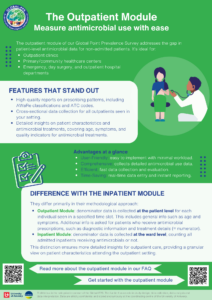The outpatient module
 This new feature was developed following requests of several Global-PPS participants, as patient-level data from the outpatient setting are generally limited. The outpatient module allows institutions to measure antimicrobial use in outpatients, meaning patients who are not admitted overnight. The module is particularly useful for facilities such as outpatient clinics, primary or community healthcare centres and certain hospital departments including emergency, day surgery and outpatient departments.
This new feature was developed following requests of several Global-PPS participants, as patient-level data from the outpatient setting are generally limited. The outpatient module allows institutions to measure antimicrobial use in outpatients, meaning patients who are not admitted overnight. The module is particularly useful for facilities such as outpatient clinics, primary or community healthcare centres and certain hospital departments including emergency, day surgery and outpatient departments.
The advantages of this cross-sectional method include:
- User-Friendly: easy to implement with minimal workload.
- Comprehensive: collects detailed antimicrobial use data.
- Efficient: fast data collection and evaluation.
- Time-Saving: real-time data entry and instant reporting.
The outpatient module offers a trustworthy way to collect antimicrobial use data in outpatients in high as well as low and middle income countries. Participating institutions receive extensive, high-quality information about prescribing patterns in their outpatient units. Furthermore, the outpatient module supports real-time data collection. In other words, data can immediately be entered in the Global-PPS web application during data collection, consequently speeding up and simplifying data entry.
On top of that, users will be able to generate feedback reports and Excel-files including detailed information about the AWaRe classification and ATC codes of the prescribed antimicrobials. View an example report with fictional data here.
تجميع البيانات for outpatient departments includes all outpatients seen during a timeslot of at least half a day on the day of the PPS, whereby brief information is collected for all patients and more detailed data for patients receiving an antimicrobial treatment.
Essential data to collect are the patients’ age category, gender and presenting symptoms. Data on admission status should be additionally collected for emergency and observation departments.
More detailed information should be collected for each patient receiving antimicrobial treatment. This includes information on their specific age and underlying morbidities, as well as treatment-related information, such as:
- the specific antimicrobial agent,
- dose per administration,
- number of doses per day,
- route of administration,
- anatomical site of infection,
- indication of therapy (community- versus hospital-acquired infection or prophylaxis), whether the treatment was based on a Point-of-Care test, Rapid Diagnostic Test or biomarker and
- whether local guidelines are available for the prescribed treatment.
Denominator data are the number of patients that visited the department in the surveyed timeslot on the day of the PPS.
They differ primarily in their approach to data collection:
Outpatient Module: data is collected at the patient level for each individual seen in a specified time slot. This includes general info for each patient such as:
- Age
- Sex
- Symptoms
- Ordered tests
However, additional info is asked for patients who receive antimicrobial prescriptions:
- Co-morbidities
- Diagnostic test info
- Treatment details
- Quality indicators
Inpatient Module: data is collected at the ward level, focusing on denominator-based metrics for all patients in a specific ward, rather than individual patient details.
This distinction ensures tailored insights for outpatient care, providing a granular view of prescribing practices compared to the broader focus of inpatient data collection.
Our activities around the world
الدول المشاركة بالمسح المقطعى محدد الزمن العالمى (Global-PPS) outpatient module

global-pps-outpatient-worldmap

